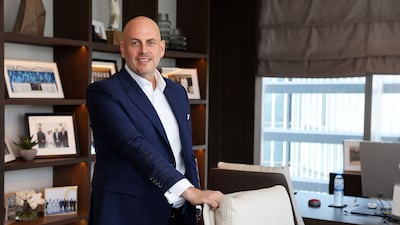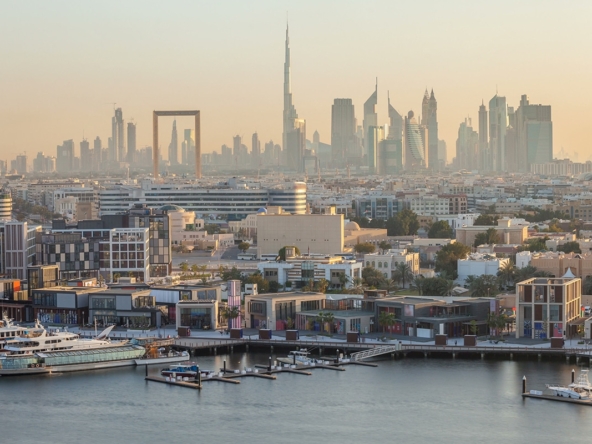Sean McCauley, chief executive of property consultancy Devmark, says investing in his business has been the best decision
As the chief executive of Devmark, a Dubai-based property consultancy, it is only fitting that Sean McCauley grows his wealth through real estate investments.
Originally from South Africa, his passion for real estate began early, inspired by accompanying his mother on open house tours.
He moved to Dubai in 2012, attracted by the city’s dynamic real estate market. He began as vice president of sales at Damac Properties. His career then led him to Asteco Property Management as executive director.
In 2018, Mr McCauley founded Devmark after identifying a gap in the market for a company specialising in development marketing and sales services for residential projects.
Under his leadership, Devmark has secured more than 30 projects and sold over 5,000 units with a combined value exceeding Dh20 billion ($5.4 billion).
“We help developers launch projects. My role primarily is to ensure three things. One is to have a healthy pipeline of projects. Second is to ensure that we position those projects correctly. And third is that we sell them out,” Mr McCauley, 48, says.
He completed a programme in strategic management and innovation in real estate at Harvard University and earned an executive MBA from Henley Business School.
When he is not working, Mr McCauley enjoys exploring new destinations with his family and considers himself a passionate foodie. He lives with his family in Jumeirah Golf Estates, Dubai.
Did wealth feature in your childhood? What did you learn from it?
When I was very young, my family was pretty well off. We had money and then we lost it all. We had to move into a single bedroom in my grandparents’ house. Later in life, my dad rebuilt everything from scratch again and was quite successful at the end. So, it was a bit of a roller coaster. One day, you would have money flying around and the next day there wasn’t money for anything.
That taught me two things. One is that you can lose things very quickly, so don’t take it for granted. It gave me this fear of losing everything. I’ve always had that fear, and I think that’s what’s driven me in many ways to be successful, put in the extra effort and not give up.
How did you first earn? What did your first job pay?
I’ve always been in real estate. I went to university, completed my degree in commerce and at the age of 21, I entered real estate, which at the time was very unusual.
So my first job was an estate agent and it was commission-based only. In terms of a salary, it only came later in life as I grew my career in real estate. But the very first job was learning to earn your own deals and create your own success through commission.
Did you face any early financial jolts?
Yes, the scars are still there. It happened twice. The first time was in 1998 when interest rates went up to 24 per cent per annum in South Africa, so no one was buying property. It was a manic time to be in real estate and was exceptionally difficult to try and sell properties in that environment. Properties there are primarily bought through mortgage, very few cash deals.
The second time was during the global financial crisis in 2008-2009. At that time, I had built up a portfolio of 23 properties in South Africa and they were all mortgaged. It was hard trying to keep things afloat when you’ve 23 mortgages to pay and your money is coming from real estate.
How do you grow your wealth?
I’m obviously biased because I’m in real estate. Firstly, you can borrow money to buy real estate, which you cannot with other assets like Bitcoin, gold or silver. Secondly, you can earn a good return by renting out property. Thirdly, capital appreciation normally comes with real estate, so it’s passive income.
I like to call it money you’re earning while you’re sleeping. If your property is going up in value, it’s happening while you’re sleeping. If you’re getting rental income, you’re not working for it, so you’re getting the dual effects of a return through rental income and capital appreciation. For me, it’s real estate all the way.
Are you a spender or a saver?
In my personal capacity, I’m definitely a saver. I’ve always worked very well with money. However, in business, I’m quite aggressive in spending but only in the right areas. I’m not scared to spend, but I will do it only so far as it’s calculated spending.
In the middle of the Covid-19 pandemic, we took some very bold decisions in the business and invested heavily.
What has been your best investment?
The best investment would be believing in myself and my partners and starting Devmark and backing us. It was a very big decision to start the business, risking our life savings to do something no one’s ever done before.

Our business model was never tested as a standalone business. So for us to roll the dice with our life savings was very risky, but it’s proven to be a great investment. I’m glad we invested in ourselves rather than others.
Any cherished purchases?
Eventually, I’d say my home is a cherished purchase. Being in real estate, we’d either rent houses because I got a good deal, or if I got a good price for the house, I would sell it and move on. We’ve moved over 30 times.
So, I would now say that my current home in Jumeirah Golf Estates is my most cherished purchase, because, for one, it’s a home and not just a house. But it’s taken a very long time for me to see the house as a home.
Any financial advice for your younger self?
It would be to not overleverage yourself. When I bought all those properties, they were all mortgaged. I think debt is good, but it should be manageable. You have to account for emergencies. That’s what I missed.
Otherwise, no regrets. I think they’re all learning curves in life.
What luxuries are important to you?
Only one, which is family holidays. I give 11 months of the year to Devmark, so it’s only fair that I give one month to my family. We go on a month-long holiday once a year and spend good quality time.
Any key financial milestones?
The first one was moving to Dubai. I think it opened up huge opportunities by being exposed to so many higher levels of business and wealth. The second milestone was investing in the business. What fruits have come to bear from the business have been great.
What are your financial goals?
The long-term goal is to have financial stability and a property portfolio that will bring in regular money each month. I’d like to have those properties fully paid off at some point.
In the short term, my goals are to travel, spend more time with family, enjoy the little luxuries life has to offer, and to carry on growing the business and see people grow within the business, which has been very rewarding.
We have more than 200 people that rely on Devmark each month. It’s rewarding to know that you are responsible for that.
How do you feel about money?
You need to respect money and have a very balanced approach. You must acknowledge that you need money for the rest of your life. The balancing act is not to let it control or change you.
Sources...



